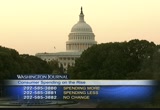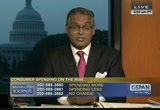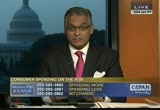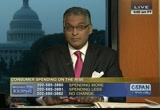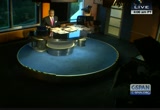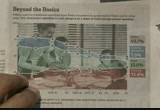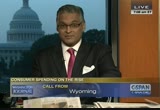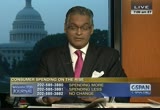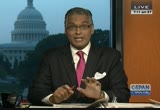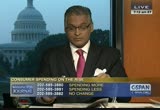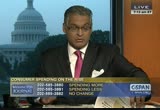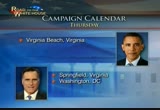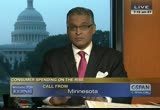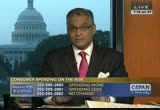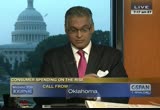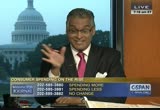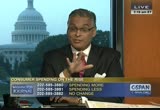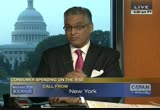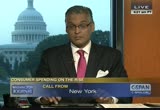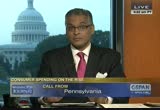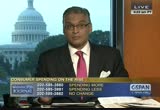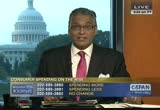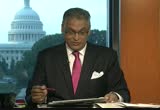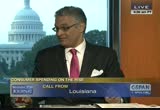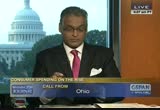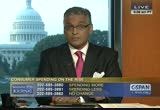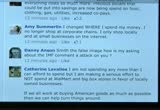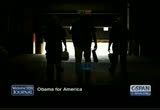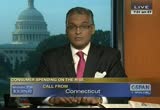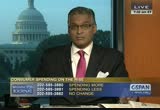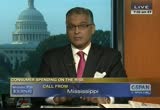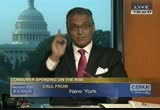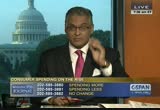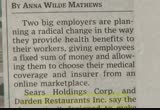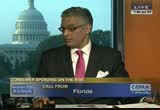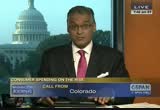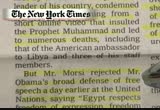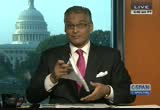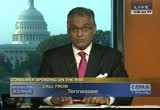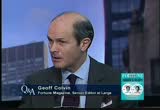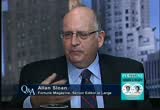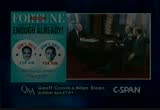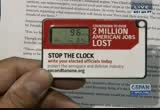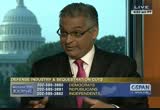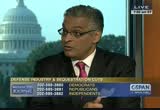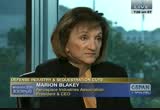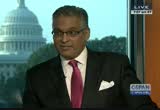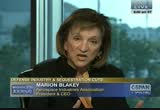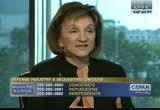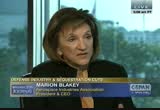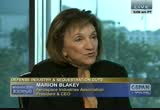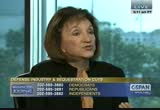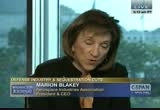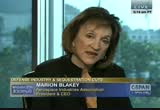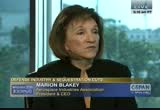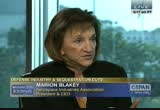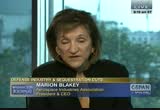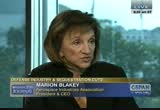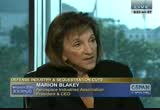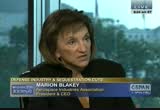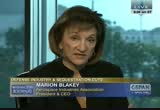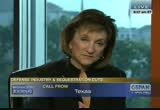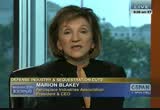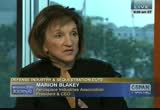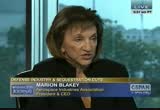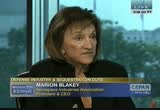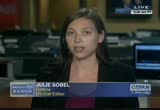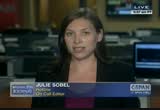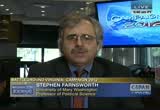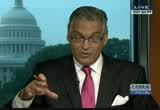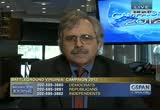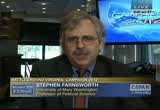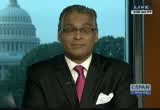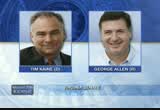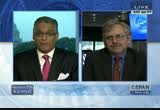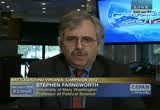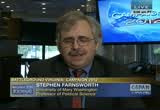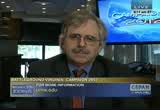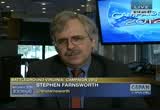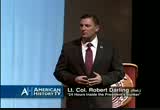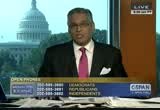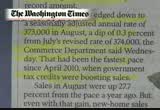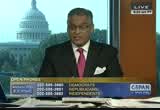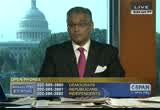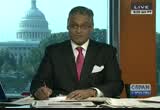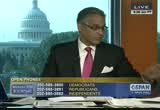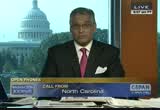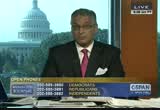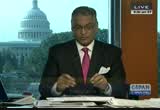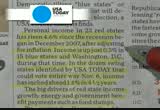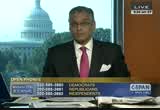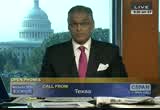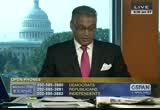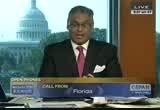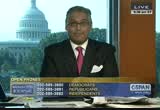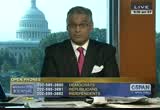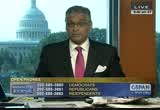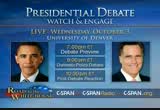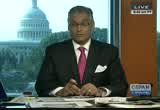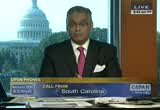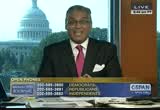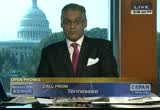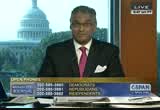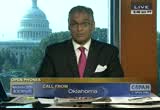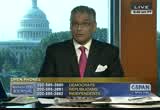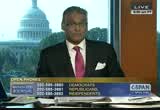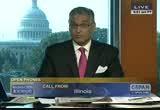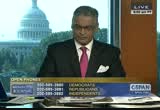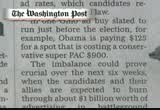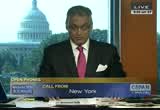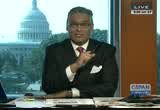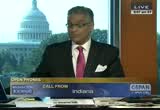tv Washington Journal CSPAN September 27, 2012 7:00am-10:00am EDT
7:00 am
discuss defense contractors. a look at the urging of politics, and a george mason university professor on the sake of the u.s. housing market. host: several stores focusing on the battleground state of ohio. president obama with a five piont lead. president clinton hinting an arm of al qaeda was behind the
7:01 am
attacks. a wall street journal stories says companies are changing how health care will be a provided to their employees. they will give their workers a fixed amount of money and allow them to choose their own medical company. consumer spending saw the largest rise in 2011 suggesting customers are spending more at restaurants, clothing, and for health care. we will look at what the labor department found out. but we want to talk to you about your spending habits as they stand today. are you spending more, and if you are tell us why.
7:02 am
7:03 am
7:04 am
again, on social media there is a poll we put on our facebook page. there are to the boys you can wait and as well. -- there are two ways you can weigh in as well. i suspect that will increase as the hour goes on. if you want to participate to our facebook page and make your thoughts known. let's go to the funds. this is tina. tell us a little bit about spending as you see it. caller: we do not get to spend anything extra. we live paycheck to paycheck. my husband is in construction.
7:05 am
they keep saying construction is coming back, but it is not. host: how many hours is he working on the average? caller: 40 hours depending on if their brains, then he gets less. host: is it tom construction? caller: yes. host: what areas are you spending less and? caller: we do not get to do anything. we do not have extra money to do anything. we are in a process of trying to get our home modified to keep from losing it. we have no extra money. we do not spend and go to wal- mart and spend. my biggest expense is my grocery bill. host: what is that like? caller: we average about three and and $50 to $400 a month with just me and my husband.
7:06 am
-- $350 to $400 for just me and my husband. host: hubert is next from maryland. caller: hello, how are you. thank you for taking my call. i find myself spending a little more with my family right now. we just feel everything is getting back to normal. we tried to cut our spending one year or two a go. now we can afford some things. we are trying to do our part. we go out as much as we used to go.
7:07 am
we --[indiscernible] host: how much of your spending habits are tied to your confidence and a job and the economy? caller: we have good jobs. we have jobs. we do not have the fear of losing our work. we both here like -- we both feel like we are doing a good job. the area we both work in is highly demanded. we do not have that fear of losing our jobs. we are making good enough money. we should get back to our normal habits and enjoy life. host: this is a graphic provided
7:08 am
by "the wall street journal." when it comes to various categories, the average spending was 3.5% of average spending in the clothing and shoes. 13% went to food. housing took up 33%. next up is a board and from kentucky -- wyoming, i i am sorry. caller: good morning. i am not await. i am drinking my coffee. thank you for your service. my spending has not changed. it is like the french
7:09 am
existentialist philosopher says, for every human need, wait until it goes away. i think there is a little too much market creation going on, try to get people to spend too much of their precious money they might earn. there seems to be too much selection out there in the stores. if there was less selection, maybe i would spend a little bit more. that is about where i am at. host: can you generally tell us how much you make a year and what do you spend a year? caller: i do not have those statistics, i really do not. i am grossing with my two part- time jobs which seem to be turning into full-time jobs, then i have a couple of little pensions. i grossed maybe $40,000 a year. i spent just about all of it, i
7:10 am
guess. host: is the spending mainly in the category of necessity or their luxuries' for you? caller: i spend on a few luxuries, mostly on my grandchildren. i would rather starve than not be able to spend some money on my grandkids. host: that is gordon from wyoming. you can send us eight weeks or hit us up on facebook, too. -- you can send us a tweet or hit us up on facebook, too. here is a headline.
7:12 am
you can decide if you want to tell us if we are spending more, less, or no change. richmond, va., this is kim. caller: hello, we are spending less. and one of the red states. i am part of the 47% mitt romney does not care about. between three marriages we have raised nine and we did well in their education and we hope the love we shower on them will transfer to us. in this election we get those people out that are trying to take my social security and put it on wall street. host: what are you spending money on? caller: with the kids going back to school we had to make sure their deeds are properly met. -- there needs were met.
7:13 am
we had to make sure our bills were met. we do not make a lot of money, but we know how to spend within our means. we had to downsize to meet our income as the children dropped off and went on their way on a scholarship. host: are we talking children in college? caller: yes. i have four in college. one is graduating in may. it and there is going back -- a that there is going back. with the income levels they do not have the jobs to keep the bills paid. the parents will not say anything because they love their children. host: you talk about strategies to save money. you mentioned moving to make that happen. what other things do you have to do?
7:14 am
caller: we cut back on going out a lot. every once in a while we might order chinese and pick it up. the gas prices have not hit us that hard because we do not go far anymore. we put vacations off until things change. we are waiting for this election so we can get a congress that works for the people and not corporations. that gives me hope that i know when my retirement comes i will be able to reach some of the for that i put out there. host: we invite you to stay with c-span. at 8:30 we are focusing of virginia as the battleground state. we are talking to a professor to let us know what is going on as well as both presidential candidates campaigning in virginia today. president obama will be in virginia beach and mitt romney will be in springfield for a
7:15 am
veterans rally. if you want to see more about those events as well as every other thing going on, c- span.org is where you can turn to. stay with us that a:34 analysis of virginia. st. paul, minn., spending more is the category. mike is joining us. caller: i find myself spending more these days. just with the basic essentials such as gas, utilities -- i am a single father. a lot of my income is going directly to my son. there is really no room for savings at this point. i think a lot of it is the rise
7:16 am
in gas. host: how much is a gallon of gas? caller: it is about $3.60. host: how much do you burn after a week? caller: $50 is probably a fair estimate. host: as far as other spending, you mentioned your son. what about luxuries'? caller: i think that is pretty much staying the same for me. i like to treat him to some luxury's every once in a while. for the most part, it is just the basic essentials which is living and gas. i was going over my budget the other day, and i realized i have put pretty much no money back
7:17 am
for savings this year. that comes as a shock to me. i do not have the luxury of printing more money. host: do you have anything as far as a retirement plan you contribute to? caller: i have a substantial 401k that i have been throwing money at. i try not to think about it. then i want to spend it. you know, that is more for my son than anything. it is kind of out of touch for me. it has not grown much in the past 9-12 months. host: that was mike. on twitter this morning, and gas prices was a concern for this person. will in oklahoma. goodmorning. caller: i do want to answer that
7:18 am
question. before i answer it, i want to make a fair comment they about c-span. -- i want to make a fair comment about c-span. you're basically repeating what i think is a government propaganda line about consumer spending in such a way to promote the re-election of barack obama. these stories get planted by administration officials in major newspapers like "usa today"to increase the chances of reelection. you are repeating it, pedro, as i have seen it in the past to cut off conservative and libertarian callers very quickly when they criticize what you are doing or what c-span is doing. i want to make that fair criticism before i answer your
7:19 am
question. host: since i have not cut you off yeah, go right ahead. caller: especially since yesterday there was a major news development that c-span could have run as the lead story this morning about a comment made on c-span by gentlemen patrick clausen for the washington institute for policy where he stated almost unequivocally that there needs to be a false flag provocation event in the persian gulf to start a regional war with iran. that could have been their first story today, but it was not. you are talking about how everything is looking hunky dory for the economy. host: you have made your point. i let you have them. as far as our question is
7:20 am
concerned, you called us and you have no change in your spending habits. tell us why. caller: we have a rapid inflation going on right now. 1 gallon of milk is as high as it has ever been. gasoline prices are as high as they have ever been. utility prices are higher than they have ever been. there is rampant inflation. that will be sorted out in such a way. it is to redistribute wealth from the port to the big banks. that is what is going on right now through qe3 and the rampant inflation where printing presses are on nonstop right now. host: thank you very much. caller: hello. nice talking to you. i have to tell you, i am definitely spending less. i make my money on ebay. i worked out of the house.
7:21 am
host: what do you sell on the day if i ask -- if i may ask? caller: electronic goods. vintage stuff. i develop the machines. it is a special item that nobody else has. i worked in television before i decided to go on my own. so i know what goes on behind the scenes. i have to tell you, just looked at it. even if you are looking up anything, you see things not closing. we are in terrible shape. i am listening to the radio in my car driving to the diner. one out of four people are living in poverty. it is unbelievable. the people are so duped with the president we have now.
7:22 am
if he was going to do something, why does he not do something now? i am an independent. i say to myself, why do they not do something -- he is in power already. just show some kind of change. he waits until after the election and b.s.'es the people. now i realize, people are so duped. it is unbelievable. it is unreal. host: this is richard spending more. how're you doing. caller: it is funny. sometimes i listened to the callers. i really like c-span. i swear to god it is like you have lobbyists calling in. it is the congress causing the problems. i spend more right now. the reason why is because i made
7:23 am
sure that i saved money. i retired the right way. i downsized. i bought and purchased things that would make life more affordable for me. moving ahead with the future. like i said, sometimes, you know, it is like they all think it is all on the president. they want to buy barack obama. these guys are paid lobbyists calling in. i listened to them and i crack up when i hear them. can there be that many stupid people i in this country? host: where are you spending more specifically? caller: on transportation. i got rid of the big truck. i bought a four-cylinder car. i downsized my living expenses. i live in a much smaller space.
7:24 am
if you look at san francisco and new york, they're talking about building micro apartments. people have to live within their means. you can spend a little more if you are smart about the way spend their money. these idiots get on here and complain. it cracks me up. i love c-span. i listen to you all the time. i really appreciate the service that you provide. this is the only way i get to say anything. barack obama is going to be the next president. one of the reasons i am spending more is because after watching the secret little taping the of mitt romney, that is why i am spending more. i know now he has no chance of being the president. host: if you want to comment about your consumer spending,
7:25 am
7:26 am
ohio was a stop for both candidates. this is the headline. consumer spending is the topic for the next 20 minutes or so. eugene says he is spending less. caller: i want to let you know, c-span is my television station. there are jobs out in the world if you want them. it may not be what you want, but it is a job. host: what are you spending less
7:27 am
on? caller: groceries, shopping, helping my daughter going to school -- college. she will graduate december 14 in the nursing. host: go ahead. sorry to cut you off. when you talk about spending on food and college, what do you spend for yourself? what are you spending less on? caller: groceries. gas. things like that. host: doug is next from columbus, ohio. caller: i appreciate the feedback from people across the country. my case is a bit different. i am spending more with less income streams in the household. i think that is a prevalent
7:28 am
trend occurring across america since our recession began in 2008. for industries like mine in real estate, it hit in 2006. you get in a motor going back for job training and college. the one area that of george a lot of your income actually is college tuition. -- that absorbs a lot of your income is college tuition. back to the idea of spending more with less. being a married man with one daughter, we are about $36,000 a year of income when they used to be a double income household. i am very thankful to be a student and getting more knowledge. three and a half years and four years of being in college, you
7:29 am
are kind of out of touch with what is happening in the world. you are advertising a year in come with one income when they used to be two. that is a prevalent trend. the scale of the economy, income levels have gone down for jobs that have now been automated. through attrition people leave it. they have figured out how to hire people back in at lower wages. that is why we are spending more with less. we are required more for less money for the jobs prior to 2006 or 2008. host: we have to leave it there. i apologize. facebook --
7:30 am
we mentioned several states being battleground states. a new ad out from president obama's campaign. it is about two minutes in length. we will show you about one minute of -- of it. [video clip] >> if i could sit around with you, this is what i would say. when i took office we were losing a hundred thousand jobs a month. today i believe as a nation we are moving forward again. we have much more to do to get people back to work and to make the middle-class secure again. governor mitt romney believes with even bigger tax cuts to the wealthy and fewer regulations, all of us will prosper. he double down on the same trickle-down policies that led to the crisis in the first place.
7:31 am
what is my plan? first, we treat 1 million more manufacturing jobs. give tax breaks to companies that invest in america and do not ship jobs overseas. we cut oil imports in half and produce more american made energy. well, clean coal, natural gas, wind, solar, biofuels while doubling the fuel efficiency of cars and trucks. host: back to our topic. are you spending more, less, or no change? for those who participated, 24 votes saying they spend more, 43 say spend less. 14 of votes say no change. this is elizabeth. good morning. caller: i would like to tell people the reason we are about the same is because we have always lived below our means. rather than live within your
7:32 am
means, live below your means. go to a community college. this is what i had done. have more than one iron in the fire. if you have time, take other courses so that if you lose your job you can get into a another field. i go to estate sales. i saw some of the stuff on the internet. i go to good will. when i came to america adventure 1969, the first thing that struck me was the waist. i still see tons of waste. if you drive around on bulky trashes, people throw stuff away that other countries do not have. refugee camps -- they do not even have a glass of water. i think the poorest person in this country is probably 60% better off than most of the rest of the world. i am talking about the countries that are in conflict.
7:33 am
you are in america, you can really help yourself by some of the ways that i said. host: for those spending less, this is sabrina. caller: good morning. we are definitely spending less. i am spending less as far as i am not able to take as many vacations. i usually take two or three a year. i want to say the past the dead years i have not been doing that. even though i am spending less -- the past two years i have not been doing that. i am in the investment real- estate business. there are a lot of the fields out there as far as apartment buildings. i have been able to gain because of that situation. in my everyday life we are spending less. host: is that because of economic conditions or you do not want to spend as much as you usually do? caller: for us it would probably
7:34 am
be our choice. everything is so much more expensive. i think somebody touched on that even though there are still spending, they're not spending in the same places. i am somebody that would buy a tiffany per se for $1,500. i do not do that anymore. there are trends icy like my vacations, those things of cutback. in the economy that we are in, with everything being so expensive and everyday things, mississippi has a 6% tax on groceries. this has to be the highest gross replace i have never seen in my life. -- grocery place i have ever seen in my life. we have to cut back on things. host: usa today has a story about young turk car buyers. -- young car buyers.
7:35 am
7:36 am
i see the spending and i see the waste. my business reflects on wall street. wall street reflects on my business. when the upper class is wealthy, the business trickles down. i am doing well. when people are holding onto their money, i do not do so well. it affects the small people more than the bigger people. host: what do you do? caller: a server. host: what are the tips like? caller: they are not like they used to be. the spending is not the same. these are everyday people. these are not luxury items. they need at a diner to spend some time with the children. there is no time. it is not like this is porter house or something like that. this is a hamburger type of
7:37 am
place. regarding our spending, i live alone. i do spend more. i believe the gas price reflects on everything. the cost of everything has gone up. as a result of the increase in gas price. i take public transportation and i still pay more. that goes up as well. we need to produce things locally. we have tropical states in the united states. why do we import food from outside of the country? the gentleman talking about mr. obama -- people forget here in the united states the president is now have total control. he makes a proposal to do something, but that congress refuses it. he does not have total control. host: maverick off:twitter says
7:38 am
this -- you can weigh in on what you're spending is like. we wanted to show you this ad from mitt romney. he is promoting his jobs plan and also criticizing president obama. [video clip] >> too many working are living paycheck to paycheck, trying to make falling incomes meet rising prices for food and gas. more americans are living in poverty than when president obama took office. 15 million more are on food stamps. president obama and i both care about poor and middle-class families. the difference is my 5 -- my policies will make things better for them. we should not measure compassion by how many people are on welfare. we should measure compassion by how many people get off welfare and get a good paying job.
7:39 am
my plan will create 12 million new jobs over the next four years. we will strengthen the middle class. i am mitt romney, and i approve this message. we cannot afford another four years like the last four years. host: off of twitter on our categories. on the front page of "the wall street journal" -- in the first craft explain what they are going to do.
7:40 am
there is more attacks to the story. you can go to the wall street journal. here is lucille. caller: i have been listening to all these people. one thing that reinforces the belief i have, people that come here from foreign countries with very little seems to know how to manage. they do not blow money like there is no ma -- no tomorrow. i am 75 now. since i was in my 20s, like the lady from connecticut -- for shops because i have to raise a family on my own. i could have had a big house, but i took a smaller house. when i got raises, yes, i used some of it in my living. the rest i live without it before so i banked it. several people are saying there is nothing president obama can do because he does not control
7:41 am
everything. the first two years he had complete control of the senate and the house. he could have gotten jobs going. he could have done all of these things. he spent that time trying to jam through health care program that really was not very well received or wanted. that was a waste of time. that was a waste of an opportunity for him. i am sorry he did that. i am sorry for the people who believe there is nothing he could do. he could have done plenty. now we are going to suffer. host: there is a survey that was done this morning by a merrill lynch.
7:42 am
this is dave. hello. caller: i make more money than i used to. i do not spend any more because of -- my occupation. i want to address the caller who was a waitress. she said her tips were worse. i never cut back on my kids. the one thing i did do was give more money to people who need it tips. the concept of as we rise we have to lift. we have a government that understands that as we rise up,
7:43 am
we have to lift -- that is what i wanted to say. host: the morning, i was. joe, good morning. -- des moines iowa. caller: i live below my means, and i am spending more. i spend more on gas, milk, water, my property taxes are rages, my electric bill. propane and health insurance. the u.s. has no budget, and i have a budget. i live below my means. host: this story about the u.n.
7:45 am
by the way, if you are interested in what is going on at the un, live on c-span at 4:30 in the afternoon. you can see a speech by the libyan president. they will address the general assembly today which is meeting. again, that will start at 4:15. you can see that on c-span and c-span.org as well. one more call on this topic. nashville, tennessee, hello. caller: good morning and thank
7:46 am
you for taking my call. my partner and i live on a very tight budget. the two of us may just under the $47,000 mark. at the beginning of this year we both decided that we were going to cut our budget back 10% because we needed to donate to the obama campaign and try to elect as many democrats and representatives as possible. we are hearing no, no, no from the tea partiers. we really are spending more on some things that we cannot help. house insurance and things like that. i am a little perturbed when i hear people say that milk and things are costing them more. i shop and i am spending less sunup than i was three years ago. i have receipts to prove it.
7:47 am
if you live on a budget and have made it a practice for a while, it is easier to watch and cut your corners. that is what we are doing. that is why. host: that is the last call we will take on this topic. you can continue the conversation on twitter and facebook. you can participate in the poll on facebook.com/cspan. coming up we will take a look that budget cuts particularly when it comes to defense contractors. we will talk to marion blakeyl. later on we are focusing on battleground states. mr. farnsworth will join us for that discussion. that is right after this.
7:48 am
[captions copyright national cable satellite corp. 2012] [captioning performed by national captioning institute] >> i watch c-span every time -- especially when there are even going on. any time something is going on, i want to watch c-span because they typically have the best most unbiased view of what is going on. i love c-span. i watch it on tv or on line. if i want to know what is happening, i always turn to c- span. i do not know if i have a favorite show. for me it is any time i need to know what is going on, i know c- span will have the real story of what is happening. >> josh truitt watches c-span on direct tv. c-span, brought to you as a public service by your television provider.
7:49 am
>> the first thing in our article is getting medicare costs under control is the number one priority. that is the most untouchable thing. and that is going to cause more trouble than any other problem we have fiscally in the united states. getting medicare costs under control is the number one thing. >> you see we also surcharges' smokers and the obese for their medicare coverage. where did that idea come from? >> i in the person who put it in the memo, but i did not have to fight hard for it. this is something i ran in the washington post. i called them mega fatties and i was rebuked for being insensitive, and i guess i probably end. this is another thing where
7:50 am
everybody knows this to be true. somebody has to pay for it. i am not saying you should bankrupt people if they are too heavy, but there should be penalties. i am not really a democrat, but i am a democrat compared to him, but you have to be responsible for your personal behavior. >> we should point out also that we are not the only ones making arguments like this. there have been other bipartisan commission's. the task force headed by a democrat and republican also said with regard to medicare we need to do something about the obese and smokers. they also had a proposal that was more complicated than ours for restricting the spending on the end of life care. by the way, these are difficult, painful decisions. we are going to have to face them. >> fixing the economy, sunday at 8:00 on "q &a."
7:51 am
>> washington journal continues. host: we are looking at budget cuts especially when it comes to the defense department. marion blakey joins us. could the start by telling us guest: he represent:i represent the aerospace and defense manufacturers. this is everything that flies with a commercial, military, space, 360 companies. host: what are some of the names people my recognize? guest: boeing, lockheed martin. a lot of smaller companies, too. host: you have been giving out this clock. when it comes to taking a look at sequestration. it shows about 96 days left. what is important to know about that number from the people you represent?
7:52 am
guest: we are running straight for a fiscal cliff everyone talks about. the number of days is all that is left before the law goes into effect. that is what some people do not realize. this is a law on the box. it is not just a proposal. we are facing reality unless we change it. host: does that preclude that nothing can be done about it wants congress comes back from the election? guest: we are putting a lot of hope on the lame duck session. we are hoping they will get a dose of reality. people do not want to see the undermining of the national security or the job losses going on with this. the congressional budget office said this will push us back into a recession next year. i think after they have had conversations at home they will come back and we hope they will be much more realistic about dealing with the real problems, which are the debt, the deficit,
7:53 am
the fundamentals of us spending too much, in time to reform has to be put in place as does tax reform. host: there was a story taking a look at the defense industry yesterday. guest: we are in a tight spot. there is a lot has been on the books since the 1980's that requires you give your employees notice, 60 days usually and 90 in the new york, if you're going to have massive layoffs. that is what is already taking place. we have massive defense cuts last summer when the budget control act went into place. $487 billion cut. a lot of that is now forcing companies to close facilities. to really pull back because there is no choice.
7:54 am
host: a covers the situation, we do not even know what will happen yet and yet they are taking place. guest: it covers any situation where you have to do these massive layoffs. last summer congress already took a huge whack out of defense. now we are anticipating in january we will be in the same spot. companies have an obligation to their employees. they have a responsibility to their shareholders. if you know something is coming, you have to act on it. we will see more pink slips this fall. host: there is a gentleman at the center for strategic budget -- todd harrison. when it into sequestration, he says this. it will be three or four years before defense companies feel the whole impact of sequestration. guest: coming from someone in a
7:55 am
think tank who does not have bottom-line responsibility in a major business, there is a difference of perspective. he is right that there are going to be increasing affects over time. the fact of the matter is, they cuts for next year are major cuts. where you have to begin a cut is in the areas that you can. that often goes to r&d, it goes to the modernization programs -- and that is what we are counting on for our technological advantage anywhere in the world. it is much harder to cut in the operation, the minutes, the ongoing costs. these are cuts across the board. where we think we will see the most up front will be in a lot of the defense industry that supplies technology. host: if sequestration takes place, what happens to programs
7:56 am
already current with defense contractors? guest: we will see cuts come into the programs without a doubt. we do not have the details. industry really does not thrive on uncertainty. everybody's trying to make decisions in a fog of uncertainty and they do not know what is coming. you tend to take the most conservative position because you have to. right now we do not know which programs will be hit and how hard. it only makes sense that this is approximately a 10% cut on top of the already massive cuts. we begin to say, you are going to have to prepare for it. in many cases you cannot just close 10% of a facility. you cannot shut down 10% of a line. you have to make business decisions.
7:57 am
sometimes it is no longer viable from a business perspective. host: marion blakey served a five-year term. if you want to ask her questions, the numbers are on the screen. you can also send us say tweet. is this a bipartisan issue as to go to capitol hill? guest: it is very bipartisan. one thing that is important to note is that leadership on both sides -- the house and senate, all agree that sequestration will be a disaster. it is something we need an alternative to. it does have to be a bipartisan solution. as we are thinking. we do see leadership stepping up on both sides of congress.
7:58 am
host: how do you keep this happening as far as congressional action is concerned? guest: the problem is we are up against the law. congress has difficulty getting laws on the books. this one will have to be rolled back by a piece of legislation that they have to pass through enough of the 435 members willing to stand up and said, we made a mistake. this is bad public policy. we need to step away from it and do something that actually addresses our fiscal problems in this country. sequestration only takes a neck out of the dead and the deficit. does not do anything fundamental. -- out of the debt and deficit. host: our first call is from michigan on the democrats' line. go ahead. caller: i am curious about defense spending. it seems to never stop
7:59 am
increasing. we have had the war in iraq for 10 years. that has cost as well, around $1 trillion? the war in afghanistan has been dragging on for 11 years. that is costing us on the $500 billion. we spend a huge amount of the budget -- half of the discretionary defense -- discretionary spending is on defense. i think spending on the military has doubled in 10 years. now we have a $1 trillion deficit the last fiscal year. if the defense hawks of the military industrial complex want to increase defense spending -- is that not cry out for tax increases? if he was significant spending -- if you want more spending even though we did not have a major threat by the soviet union facing us, does that not
8:00 am
require -- let me mention some some balls. i. simpson bowles calls for cuts in defense. >> people thought a lot of figures. on a few of them are right. defense spending is only 20% of the discretionary budget. the defense of the country is -- we do have to see that that is being maintained at an adequate level. no one suggest we are in less dangerous times. the reverse is true. cyberwarfare. thing about north korea. -- think about north korea.
8:01 am
we have the kind of unlevel playing field that has worked so well all this time. we're not going into a period that is fatal. how do you balance your budget is a bigger question. that is what we elected our members of congress to do, to make those tough decisions about entitlement spending. we're spending in a way that cannot sustain social security, medicaid, and medicare. something has to be done to reform those programs. you have to have a good balance. that's something the legislators need to address. caller: yes, hi. my party constantly says that
8:02 am
government does not create jobs. that sounds like government does create jobs. one way these people could keep these jobs if we could stop using mercenaries all the time in our wars. thank you. about well, i'm not sure the use of the term "mercenary." we think the most fundamental issue is that these kinds of flashing cuts undermine national security. secretary panetta said they will be catastrophic. the term "mercenaries" goes to
8:03 am
the issue of people that are not part of our military that also serve. there are contractors in afghanistan and other places who are supporting our troops. i do not think anybody thinks they are doing but providing the services that are important and needed. the all-volunteer army is then expensive asset and is supplemented by people who can, and and support the troops. they do it with a variety of skills. sometimes it doesn't make sense to train the uniformed military. caller: thank you for taking my call. i want to make three points. the constitution states that congress may tax to provide for
8:04 am
the common defense and general welfare of the united states and to pay the debts. it doesn't mention a global military at all. you cannot have a small government and a global military. the military is probably the most expensive part of our government. it has the soldiers and also it is funding trillions upon hundreds of trillions of dollars to defense contractors. when you add it together, you have the largest aspect of their government, the military. guest: i do not know there was a question in there.
8:05 am
going back to the constitution, if you read the constitution up front, it says our government is to provide for the common defense. it is a responsibility and the united states is the world's only superpower. we have a superpower -- we have a responsibility to maintain global peace and global security. there has not been a u.s. service member loss from an era tax since the 1950's. that's because we have erred dominance -- air dominance the matter where we go. global stability is in the interests of the united states. it does take resources to
8:06 am
maintain that. host: a direct question from twitter. guest: well, i think it is important to listen to the experts who know. technology advances and we need to maintain what is a modern, up-to-date military that can protect us in the best ways possible. i did not think many people think it was a mistake to have a gps. these are innovations that are part of the military. it is also cybersecurity. so things are intangible -- some things are intangible. there are a great things to it.
8:07 am
the important role that the united states place makes it an investment worth making. host: is there a concern about efficiency? guest: i think everyone has to be concerned about efficiency. companies are streamlining. they also make recommendations about ways to get the most from the taxpayers' money. the pentagon is putting in place and initiative they call better buying power. they look at the way they set requirements. once you make decisions about a working together with industries, making sure it is
8:08 am
done smartly and does not change over time so that things get more and more expensive. there is a great deal to this. efficiency can be had on this side of industry. we are trying to get there. host: can more efficiency lead to more layoffs? guest: it could. there is no desire to lose the human capital. some of the positions we have, folks in nuclear submarines,eight years in training. we like to bring in new people that can learn the skills.
8:09 am
but it takes years and years. we are not just talking about big contractors like boeing. 70% of the defense dollar goes to small business. we're talking about the kind of job loss that is massive to small business. one thing that matters -- a lot of these are companies that only do one or two things. they have invested in things that help support a particular product. it is hard to pull back. if that contract goes, they have nothing. they are the source of a lot of innovation these days. the small business in
8:10 am
administration look to see where the patents were going. many were going to small businesses. that is a part of the economy that will be knocked if sequestration goes into effect. host: our guest is marion blakey, president and ceo of aerospace industries association. to have vague website -- you have a website, secondtonone. guest: that is people making sure that we're able to defend and be a strong partner with our allies in maintaining security. we want us to be second to none in every regard. that website provides
8:11 am
information about the government that will be affected like the faa. they will not be able to modernize if these cuts go in. nasa, other parts of the government. we make it easy for people to contact our leaders. contact conagra's with just a click of the mouse -- contact congress with just a click of the mouse. some of the studies have been done by a professor from george mason university. host: at the request of your organization? guest: absolutely. we go to people with independent standing and authority.
8:12 am
2.14 million jobs lost to sequestration. these figures have been backed up. if this goes into effect, we're heading off the fiscal cliff into recession next year. they talk about job loss. we can see this across-the- board. this is something both campaigns have begun discussing. people understand what this means. host: and a call from maryland -- our next call from maryland. caller: i am stunned listening to your guest.
8:13 am
-- wary about losing my call i am worried about losing my call. how can we keep spending money on the pentagon? how can we possibly do that? the military budget is almost 50% of our discretionary budget. i would like for you to tell me, how can we keep spending this much money on the pentagon? thank you. guest: when you say the pentagon, and makes it sound like you're spending on a five- sided building. defense covers a wide variety of applications. bases, training, operations
8:14 am
. a lot of equipment has worn out. the protections we need. that costs money. it is 20% of the domestic budget. yes, this is something that does make a great deal -- costs a great deal. it makes a great deal of difference in terms of our national security. it has a major effect on jobs in this country. it is not possible to talk about this kind of money without realizing it underpins a great many communities in this country. the folks who do the machining.
8:15 am
that has a ripple effect throughout our committees if you cut it off and that has an economic blow to this country. this is not something we should take for granted. host: juliana on a republican line. caller: i believe obama made the defense cut because he wants the united states to be the third world country and not to be the strongest country in the world, the way america should be. and america during world war ii protected italy -- i'm getting nervous now. obama is a marxist. he does not believe in the way of the the united states.
8:16 am
the american people better wake- up. we will lose our rights little by little. i want money to be spent on defense. host: do we outspend most of the world on defense spending? guest: we spend most of the rest of the world. try to compare in the state's spending and china is impossible. labor rates are different. you cannot live it up and say this, this, and this -- cannot line it up. this is the way history has gone. there is a benefit to our citizens to maintaining an appropriate balance in peace in
8:17 am
this world. the caller was talking about the way things were back in world war ii. was a time when the united states went into war without the proper equipment. we had people training with broomsticks because they did not have rifles. cars have a sign that said "tank" to give them the idea of what it would be like when they hit the beaches in europe. we never want to be in that position again. "we can just pull back." we have worn out equipment out. we're not replace that equipment. we want our volunteer army to
8:18 am
have the best technology and protection possible. we have to continue to innovate. it will protect us. that is where a great many things that we take for granted is the backbone of our economy. the internet and gps are two great examples that came from defense spending. host: this is myron our independent line. caller: hello? how is this a fact the budget of defense -- the way to win the
8:19 am
war in afghanistan? how we can help save gold in your industry. what do you think -- stop mining -- ukrainian corruption, $200 million. guest: well, going back to 9/11, we were not prepared for that attack. \ defense spending increase after 9/11. we began to to engage in iraq and afghanistan and does work expense of conflicts.
8:20 am
defense spending went up at that point. that's the way the numbers are. those have to be looked at on a case by case basis. that those two issues of the foreign policy of the united states, as well as were we believe the military needs to be hored up. --: the defense budget does that sound right? guest: that sounds about right. caller: hello? host: go ahead.
8:21 am
guest: good morning. caller: i have a couple of comments. i was disturbed by this conversation. miss blakey a corporate head and she has to do her job. things like this -- narrow minded republicans. i think americans want something different. we want peace. i know that is her job. host: your question, sir? caller: what are they fighting for? they want to give the american people less things. it is not fair.
8:22 am
we to build back america and create jobs here. the idea of having a psychological advantage is -- host: we will leave it there. guest: everything i've been talking about this morning goes to the issue of preserving peace and stability. in the world we live and, peace must be maintained through strength. that is something most people accept. there are a number of factors in our economy. defense and military spending has a major effect on the jobs at home. the cuts are putting a risk 2.14 million jobs.
8:23 am
that is a lot of jobs. these are people, they are the ones that will be hit very hard if that kind of money is wiped out of the u.s. economy. host: 10% decrease in research and development. which category affect your industry the most? guest: probably research and development and procurement. we're also concerned about maintenance. we have care about the entire defense establishment. we are not making distinctions.
8:24 am
we're talking a great deal about defense this morning. there are other problems with sequestration's and these cuts. 50% of these cuts are coming in areas like medical research and being able to fly it saved systems. nasa. food inspectors. we will be talking about cutting back on park rangers. the medical establishment is extremely worried. "sequestration will do terrible things to our programs that are supporting the poor and those who need care. the money is not going to be there." we feel like it is bad policy across the government.
8:25 am
we need a much more strategic set of choices that congress makes. the cuts need to be well chosen on things that are lower priority. they are going to have to get under control our spending on the major entitlement programs as well as tax reform revenues. those are complex things. that is what they need to get down to work on. host: we have 5 more minutes with our guest. caller: good morning. please explain what sequestration is. the gentleman that just called
8:26 am
thought we should eliminate our defense. i wish he would understand that peace through strength means peace through strength. we need the ability to help other nations that need our help. guest: a term like " sequestration" -- a year ago, virtually no one knew it. someone said, "it sounds like a disease." to pull out of something a portion of ed and to sequester a part of the budget and apply it again to the deficit. that is what sequestration is intended to do.
8:27 am
it goes to offset the debt. look at the massive size of the art debt. gesture.re of a j i think that is what people do not understand. this is nothing more than a gesture and not the kind of reform we need. host: sue is from texas. caller: hi. i want to address marion. thank you, c-span. i'm glad we can say our say. i've learned so much about so many different industries. a lot of your comments we both
8:28 am
know are exaggerated and some are scaring a lot of people. as long as we are informed, then i think we will be better for it. first of all, cuts are tough. we need to cut more than what has been proposed for the defense industry. there are a lot of people that have gone knowledge. the defense industry has ripped off the government allot by inflated prices. there are millions of lost that are informed and we're happy with what president obama is doing. thank you. guest: certainly becoming informed it is important.
8:29 am
it is about we need our elected leaders across the board to do and address. becoming informed does not mean picking up on old myths, old things that have been said. the defense industry wastes a lot of money. you need to be specific and do your homework. once youtube that, you will -- once you do that, you'll find our military is the pride of this country and is held up worldwide as the defense sword and shield for democracy and for a way of life that we all enjoy. we owe them a debt of gratitude. host: did you address the white house about the cuts?
8:30 am
guest: we went over and met -- i have sent letters to the president expressing our concerns that this is something where everybody needs to come together and construct a bipartisan compromise. host: what was the response? guest: everybody says we have to avoid this. the question is where you put eight.y how much goes into entitlement reform. changes to the tax code. they shouldggesting not be cut on the table. it should not be done and mindless across-the-board -- host: what is acceptable?
8:31 am
guest: you are elected to make choices and to dig into these programs. get what you believe -- look at what you believe and vote for those things and not simply say, "this is too hard and we'll take a pass." host: what is susceptible to your industry? guest: we have accepted $487 billion and we expected that with good grace. and it hurt. we had last this week, layoffs in the thousands that go to the cuts that were put in place last summer. this is not without consequence.
8:32 am
we are not saying we should not accept our fair share of the burden. we are willing to be a part of the dialogue. we are not stepping away from this. across the board without any concern of what gets cut -- how do you cut a tenth of a battleship? we will continue to make sure that people who are voting is informed. we did a poll -- we asked them to see what voters in the dollar ground swing states fought about sequestration. 80% of those voters felt that sequestration should be set aside by this congress before
8:33 am
the election. that they needed to come up with an alternative. that is across the board, republican, democrat, old, young. there is a sentiment on the people saying "this is bad policy and should not be allowed to happen." that is what we're advocating. host: marion blakey, president and ceo of the aerospace industries association. thank you. guest: thank you. host: we're going to visit the c-span bus. it is at mary washington university, about an hour south from here. stephen farnsworth will join
8:34 am
us. later on, anthony sanders will join us to talk about housing prices. what is behind the rise of housing prices as well as the housing industry in the united states. but first, as senate debates take place, joining us from hotline to talk about the senate race is julie sobel. she is there on call editor. the first of the debates between dean heller and shelley berkley, the democrat. what does each person have to the chief? guest: this race has been very close for over a year at this point. polls have shown that dena
8:35 am
hellan heller was up a few poins and then shelley berkley was up. each candidate needs to find a way to break out. you'll probably see some attacks on ethics issues from dean heller. she is under investigation. this is expected to be a big issue in the race. so i thought it would sink -- some thought it would sink her candidacy. whether she used her position in congress to help benefit her husband's business. the may decision to go for with a formal investigation of her.
8:36 am
this has turned out to be a huge deal. she represents las vegas. republicans have used this issue to try to define her to voters that didn't know much about her before. the issue seems to be pretty much baked in. the race was pretty much a tie and continues to be a tie. host: what did she have to do against dean heller? guest: she is trying to tie getler to paul ryan's bud plan. democrats like to say heller voted for the budget plan twice.
8:37 am
he voted for it twice -- that line should probably come up tonight. she may say that he wants to end medicare as we know it and try to time to that. you have seen heller running ill but from romney and ryan -- running a little bit from romney and ryan. we may see that, as well -- we may see that come up as well. so, the dream act. shelley berklery supports the dream act and dean heller does
8:38 am
not. host: when it comes to polling as far as this race, what is the story in nevada? guest: for polling? we have seen a lot of ties in the polls. there's a new poll coming out tonight which will be a fresh polling information going into the debate. a lot of recent polls have been automated or republican or democratic polls. they show one candidate up a few points or the other candidate up a few points. nobody breaking out in this race. president obama is still considered -- he has been up a
8:39 am
few points in the polls. host: anything of note in how they're debating styles go? guest: neither has debated much recently. berkley -- is described as glitzy. she is from new york originally. she has been on the attack on the trail. you'll see an aggressive style likely from her. she has also tried to tone down to appeal to voters in the rest of the state. dean heller will try to make some sharper points and go on the attack a little bit. host: you can see this debate
8:40 am
on c-span and on c-span radio and monitor it on c-span.org, part of our 2012 coverage. julie sobel, thank you for your time. fredericksburg virginia is the site of mary washington university. our c-span bus travels to universities. joining us on board the c-span bus is stephen farnsworth at mary washington university. thank you for joining us. guest: glad to be here. host: in 2008, president obama won virginia. guest: -- is a state very much in transition -- virginia is a
8:41 am
state very much in transition. it was democratic and then became republican. virginia has created an environment where democrats are treated better in virginia than in most parts of the south. you're seeing a lot of people that have come to washington. there're a lot military bases. people coming from other parts of the country. the environment is much more competitive than any other southern state. virginia is one of the most competitive states because of these changes. host: we have a map of virginia where senator mccain and president obama won.
8:42 am
you can see patches of blue in northern virginia and in the east. guest: what you see is an america in miniature -- you have an area with a lot of highly educated people and defense contractors and government workers and a lot of affluent people who tend to be democratic. it depends speak more conservative in other parts of the state'. in the south side of virginia, you are pretty conservative voters. the democratic votes tend to be concentrated in the cities like
8:43 am
richmond and hampton roads. the democrats tend to win the cities. the battle in virginia tends to be in the suburbs. what you have is a state that is up for grabs. geographically, republican swill win --republicans will win many more counties. host: we're talking about virginia as a battleground state. here are the phone lines.
8:44 am
host: who are the people groups that are supporting president obama and mitt romney? guest: 1 you see in virginia is the traditional partisan breakdown. you see a strong gender gap where female voters are much more inclined to support the democratic ticket than the male voters. there have been a lot of controversies in the virginia legislature that the tried to restrict abortion. this was an idea that the government was trying to restrict abortion that caused problems in the last legislative session. with respect to the message that mitt romney has offered, it appeals to more conservatives.
8:45 am
virginia has a conservative republican party. mitt romney it may not have been the first choice. there is a third-party candidate who may impact the race a little bit. the third party can that is running as a conservative. that may impact the outcome. the more conservative voters are coming home for romney and the liberal voters for obama. you have distinctions geographically. what will matter for obama is enthusiasm. you have a large number of people that are not from virginia. they have to go to some trouble
8:46 am
to registered to vote. you have young college students. all these issues point to the question of enthusiasm. for obama to do as well, he needs to rekindle that enthusiasm. this is one of the challenges that the obama team faces, not just in virginia. host: this is johnny. caller: thank you. when the candidates campaign there, in other times you do not see the long shot to get an idea of what kind of crowds they are drawing. what types of crowds of the candidates getting when a campaign? -- when they campaign.
8:47 am
the second question had to do with the ground game. what type of ground game do you see obama and the romney people virginia? host: both president obama and mitt romney in virginia today. guest: virginia has become a true battleground state. the campaigns are here every week. you have a significant level of enthusiasm for both of these candidates. people that are committed will turn out for these rallies. the numbers are not overwhelming because there are so many of these events.
8:48 am
you are looking at thousands, tens of thousands of people at these events. michelle obama was here recently. she filled the auditorium. some candidates generate high levels of enthusiasm. think about sarah palin. she had a rally in fairfax four years ago. it was an energetic and a powerful rally in terms of people getting excited for her. host: jim from massachusetts. caller: i think basically the election it is useless. i see it all around the world. all these leaders will collapse
8:49 am
all the world economy to start the world bank for the new world order. both of these candidates, all they do is play on everybody's ults. the supreme court made a bad decision. host: next up from hampton, virginia. we have a special line. tepper, go ahead -- debra. caller: i want to make a common about what i have observed to be the current state in virginia. we're all better off than we were four years ago and i will be supporting president obama.
8:50 am
i want to make a comment about our governor. it is different from our previous republican governors. democrats and republicans have been able to support either side. our republican governors are well liked with the exception of bob mcdonnell. host: professor stephen farnsworth? guest: it is important to recognize that the economic crisis that many people have faced over the past four years has been limited in its impact, particularly around lhasa did, d.c. -- washington, d.c. what you see in northern
8:51 am
virginia is an environment where the pain is not replicated here. what ohio would give to be located here. it is important to recognize the government has a powerful impact and that represents an important question -- cushion for people in that part of the state. they might sell cars. there are a lot of the spin-off effects. the caller has pointed to an increasingly divisive legislature that you see in virginia. you had a government or the
8:52 am
state senate was blood 20-20. -- the state senate was split 20-20. it was a opportunity to move legislation forward that have been blocked by democratic majority senate in the past. the governor asked the legislature not to move too powerfully. the legislature did not listen to the governor and they went right through his yellow light. the republican party has more raein control the state. host: this is jason. good morning.
8:53 am
caller: one of the polling leads towards the left. is that incorrect? host: professor farnsworth. guest: there are great limitations to any survey. we have to appreciate that they limitations. represente if we asked a question another day. virginia shows an advantage for obama at the moment. ohio shows an advantage for obama at the moment.
8:54 am
what the polls say today may not be what the polls say tomorrow. between the number of people who participate in the election and those who participate in a survey. most surveys will have 1000 people, 1500 at the most. we have some idea to suggest these are approximations. never a magic this is an exact prediction of how things will work -- never imagined this is an exact prediction. how many young people will turn out? young people voted two to one for obama in 2008?
8:55 am
how many will turn out ? all these kinds of things require guesses. these are all approximations. i think most pollsters are pretty responsible. people have a reason to be suspicious. bo calls can create problems . also, you cannot answer a poll. how to deal with the reality that a lot of people do not have landlines and amount pick up a cell phone. host: mary from leesburg,
8:56 am
virginia. caller: good morning. my husband and i are supporting the president. do you see much evidence of switchover voting so that individuals might be supporting one party for the president and another in virginia? guest: the idea of split ticket voting would only involve a small number of people. george allen areand both well known. these are people that are very well known and both very partisan. i find it hard to imagine there
8:57 am
will be a lot of people who will say that they want a democratic president and a republican senator or vice versa. we live in partisan times. people who vote men up there mind long before election day. if you believe barack obama should be president, it's hard to think he should be undermined by voting republican for senator. if we're talking about one person out of 20 of people that have some personal aversion to one candidate or another -- i do not see there is all that much split ticket voting in the state. host: in the virginia primary,
8:58 am
ron paul got 40% of the vote. host: ron paul was much more popular here than in many other places in the country. this was one of his better showings. virginia has a large number of libertarians. there were only two candidates on the ballot. santorum and newt gingrich did not qualify. the numbers for ron paul or perhaps a bit better have been other anti-romney choices. that is one reason why mitt romney has to work hard in the state. he has to speak to libertarians
8:59 am
. and a constitution candidate. it speaks to the challenges that mitt romney faces in the state. the caller spoke about the nature of the ground game in virginia. you see more people knocking on doors and handing out leaflets. you have many more campaign offices around the state. it speaks to the extent to which virginia is being seen as crucial to both parties. host: joining us is professor stephen farnsworth from mary washington university. tell us about your university. host: we are a small, liberal arts college.
9:00 am
we have about 4000 undergraduates. we tend to be pretty selective. students can do internships and summer jobs in richmond or in d.c. it is an opportunity for students to become involved. we have a lot of opportunities. we also, of course -- host: what is the enthusiasm level for this election at your university? guest: one of the things you see with young people is a great
9:01 am
deal of enthusiasm for their particular candidate. we have an active republican organization and an active democratic organization. you see a lot of interest in both campaigns. the enthusiasm is perhaps a bit less than four years ago it is hard to generate enthusiasm for what is to come. talking about hope and change, you don't have to be too specific. once you are president, you are responsible to a degree for the record that emerges. there is a bit less enthusiasm among college students this year than there was four years ago anfor obama. but this is a group that tends to be more democratic than republican. host: massachusetts, bob.
9:02 am
caller: in virginia, would it be fair to say that many academics are democrats? let's just say in in massachusetts, cabbage, nine out of town if not higher a democratic bid even as you go across the state, it is 8 out of 10, maybe. what is it in virginia? guest: i would say, first of all, that cambridge, massachusetts and fredericksburg, virginia are extraordinarily different places in so many ways. in terms of party identification, we do not register by party. you do not look at the opportunity to register party loyalties in any way. what happens with primaries in virginia and other states is that you walk in the front door and you ask if you want a republican or democratic ballot.
9:03 am
what you choose is not recorded as a calculation for future partisan identification. you walk in as an independent, he walked out as an independent, or at least not identified by party. individual professors can speak for themselves about their own personal loyalties. what you see in many people in many disciplines is a sense of professionalism in terms of what they are trying to do and what they focus on. host: brian on our democrats' line. caller: i have a question about this electoral college. is that a fair system, or do we need to eliminate that and go vote the vote? how would that affect the outcome of the presidency? guest: well, i think there is a reasonably strong case to be made on substantive grounds about the electoral college. one of the things that really discourages people who don't live in states like virginia
9:04 am
were ohio or florida is that the election is really reduced, many of them, to a spectator role. the very clear ideological partisan leanings of their own state, they know it will vote democratic regardless of what they do or republican regardless of what they do. instead of having a national campaign, we have three or four little campaigns in a few battleground states. va benefits from this system, but for the larger turnout in the country any more engaged public, i can understand the caller's frustration with the electoral college system. what we have to add, though, is that there's almost no chance that a constitutional amendment would ever passed muster with respect to the electoral college system being abolished. and number of states are disproportionately beneficiaries of the electoral college system. the smaller states have more electors for for a -- more
9:05 am
electors per vote that the larger states. and then, of course, there are the swing states. i can imagine a coalition of small states and swing states saying no way, there won't be an adjustment in the electoral college. i understand the color bang's concern, but as a practical matter, we will have to live with the electoral college for the foreseeable future. host: how important is written as far as winning the overall war -- how important is a virginia as far as winning the overall race? guest: the victor in virginia is likely to be the victor nationally. as much as the electoral college questions still rankles, if you were to say what happens in ohio, what happens in florida, what happens in virginia -- you look at those three states, and
9:06 am
whoever wins two of them is going to the white house. that may not be what people in wyoming want to hear, but that is the reality of the electoral college system. you see just how powerful the importance of these states are when you look at the itinerary of the candidates. they are in florida, they are in ohio, they are in virginia, maybe a stop in nevada, maybe a stop in colorado. host: thomas is on our independent line for stephen farnsworth of the university of mary washington. caller: i would like to ask the professor, what does he think of to pass no n eed more than one term in the senate and no more than three terms in the house, so that we get rid of the professional politicians? no matter who wins the white house who wins control of the
9:07 am
senate and house? guest: yeah, term limits are a really interesting question. a few states have tried to establish term limits for their own members of congress, but the courts have tossed out those legislations. use the term limits for state representatives and governors. in virginia, you can only serve one term. i am not sure when you look at the outcome of term limits is that the outcome is much better. i would really draw attention and gems of the legislative branch to two things. the first is the gerrymandered congressional districts. it is a far more problematic situation that many voters don't have an opportunity to
9:08 am
participate effectively in their members of congress. this election is over before it begins in the general election. in fredericksburg, you are looking at a republican district, and democratic candidates do not win here. that creates a real problem for most voters, because the decision of who will be in congress is made by a tiny i segment of the electorate. the first problem is the way that these lines are drawn, they are drawn for partisan advantage. republicans control virginia, they draw lines to help republicans. democrats control maryland, and they draw lines to help democrats. on and on it goes. that is the first problem. the second problem is the role that money place in politics. it is really problematic to imagine that politicians can legislate dispassionately when that they received extraordinary amounts of money from individual campaign contributions. i'm not talking necessarily
9:09 am
about the hard money so much as some of the stuff going on in terms of super pacs and those things today. i'm far less bothered by the amount of money going in than i am by the problems of disclosure. one way we could think about fixing this system, which i would argue is broken in terms of the billions of dollars being spent in this presidential campaign, is to have much clearer disclosure of who is spending the money, who is raising the money, had to have that electronically available day-by-day and in terms of what is going on. the idea that these scheider groups, these super pac groups, don't have to identify donors is a real problem for me as a voter and citizen of this country. rather than worry about term limits, i think we might want to talk a little bit more about the gerrymandered districts, which create people who are not really responsive to much of their electorate, but also the extent to which money is flowing into our political system that is not very accountable, that is not being watched or reported in any
9:10 am
fashion as it should be. host: does religion played a part in virginia voters? guest: absolutely. in virginia, like in many states, you see a clear link between the level of religiosity, the frequency of religious attendance, whether it is 8 synagogue or a christian or catholic church -- what you see is the more frequently people participate in religious activities, the more likely they are to vote republican. particularly evangelical christian communities, which tend to be more organized in rural parts of the state, very aggressive efforts to connect with fellow members of accommodation to bring out more people for mitt romney. this is the key part of the advantage that republicans have in many parts of the south. it is the presence of organized,
9:11 am
religiously oriented political activity. for gin is the home state of the jerry falwell and pat robinson -- virginia is the home state of jerry falwell and pat robertson. what you see in northern virginia, in less religiously oriented part of the state, is that jerry falwell and pat robertson have little impact, perhaps only in a negative wait for many voters. you see as part of the state where a lack of religious attendance explains greater democratic voting. host: stephen farnsworth teaches political science at the university. virginia, democrats' line, hello. caller: professor farnsworth
9:12 am
just spoke about the financial part of it. a lot of people are not aware of the koch brothers' part in everything, the citizens united thing, the supreme court, not aware that clarence thomas has a financial conflict of interest, due to his wife's role as the ceo of liberty central, and that the koch brothers -- their ancestry comes from hitler -- not from hitler, but from nazi germany. their grandparents were part of nazi germany, connected to concentration camps. they have done a lot of polluting -- host: your question for art guest? caller: why are the people who are the biggest threat to democracy but emphasized? -- not
9:13 am
emphasized? why aren't the koch brothers exposed more? host: professor farnsworth, if you wish. guest: i think the color bang's concerns connect -- caller's concerns speak to the need for greater transparency in our system. when you talk about a group that is citizens for a better tomorrow, or citizens for a good vision for the future, who is behind that? where is their money coming from? what is the background of those donors? many of these things don't have to be disclosed in terms of super pacs in the wake of the citizens united many organizations offered innocuous- sounding names but have a clear, distinct political agendas that may not be clear from the title of the organization. nor, of course, with a donor
9:14 am
lists do we know who is funding these organizations as well. i think the caller is speaking to a great deal of uncertainty and suspicion. that is true of politicians on both sides. there is so much money sloshing around from organizations and super pacs that we have a reason to be concerned about what people are getting for their money. one of the things to remember about politics is that much of the money that comes in to politics is not from the idea of people who want good government generally. they want good government as they define it, which means better opportunities for their union, their industry, better advantages for their community organization. if it were not financially useful for organizations to give millions of dollars under the table, and they would not do it. as a result, it is a great call
9:15 am
for the greater need for transparency in our political system, particularly with the donors in this election cycle. has gotten out of control. host: aggie on our democrats' line. where in the state capital this ye -- does your area lie? about theu're talking electoral college. i think needs -- i think it needs to be done away with. ron paul got 107,000 votes. romney got one order 53,000. ron paul got three delegates,
9:16 am
ronny got 43. you have more people participating in local elections because it is a vote to vote. for the presidential election, people would feel like they had made more of a difference with their vote if it was eight vote for a vote in each state. i like virginia. i'm a registered democrat, but i went and voted in the republican primary because that is the way i intend on voting this time. virginia doesn't -- no matter if you are a republican or democrat, you can vote in either primary. only one primary. host: why mitt romney this time? caller: i did not vote for obama last time, but i've lost $30,000 worth of income. i just don't see the jobs coming back like they was. unless there is more fair trade
9:17 am
between china and us -- that is where my job went to -- host: thank you. professor farnsworth, hard as economics play in how people pull --how does economics play in how people pull levels? farnsworth?eife it looks like we have a bit of a technical problem with the university of mary washington. we will take your calls, and if we get him back, we can ask him as we catch up. sorry about that. looks like we are out of time on this one. coming up, we will take your phone calls. first, this news update from the folks at c-span radio. >> unemployment numbers this summer show americans seeking benefits dropped by 26,000 last
9:18 am
week to a seasonally adjusted 359,000 rate the lowest level of weekly applications in nine weeks. the labor department says the four-week average, a less volatile measure, declined to 700 -- to 374, the first drop in six weeks. other recent data shows that layoffs have fallen to the lowest level in a decade. hiring has not picked up enough to it quickly lower the unemployment rate. the commerce department says that the bans for long-lasting manufactured goods dropped in august by 13.2%, the biggest drop since january 2009, when the country was in recession. the drop was due to fewer aircraft orders. as for the overall economy, the commerce department says it grew at an annual rate of 1.3% in the spring, down from its previous estimate of 1.7% growth. the revision reflecting the
9:19 am
government's lowering its estimate of crop production by $12 billion. half of the downward revision to growth came from declines in farm inventories, but other areas were weaker as well, including a slower consumer spending and less growth and exports. the 1.3% growth in the spring follows a sluggish 2% growth rate in the first quarter. rates too slow to lower unemployment. those are the latest headlines on c-span radio. >> september 11, 2001, was a day that changed my life forever. i will go through powerpoint presentation that will outline the historical account of the attack as things transpired that day. it gets pretty intense. a lot of things happen quickly. i will do my best. i will ask you to sit back, clear your mind, put yourself in
9:20 am
that room, and you will get a real sense of what it was like to be on the top of the food chain of the national command authority, as a nation of 300 million americans was attacked by 19 al qaeda terrorists. >> more from retired lieutenant colonel robert darling, this weekend, sunday at 7:30 eastern and pacific on c-span3. >> "washington journal" continues. host: we are having technical difficulties for a last segment, so instead, we will go to the phones. again, those are the phone lines.
9:21 am
9:22 am
9:23 am
9:24 am
host: caller, how does obama handle the voter i.d.? -- how does oklahoma handle for id? caller: you have to have a state id and voter id. host: colorado springs. frieda joins us next. caller: michael has to do with libya and what happened at the consulate and the deaths of the four americans. i understand that we knew within 24 hours that it was a terrorist attack our administration from e president down kept blaming it on video, which had nothing to do with the video. and they knew within 24 hours. and they set susan rice out on all of the talk shows to lie to
9:25 am
all of the american people. i feel this was done because president obama is up for reelection and he said al-qaida was contained or done away with. and it has become all political. so he can re-win the election. host: there's a story in the new york times this morning -- saying there was a link between these attacks. she was the highest ranking obama administration officials. -- ross, from texas. on our line for democrats. caller: what i wanted to say, i wanted to complement the show. i have been watching for years. a longtime fan. one thing i wish you and every
9:26 am
moderator would do with the beginning of every interview is ask whoever you are interviewing to what they work for and where they get their pay from. and that way that would give the viewing public a better idea of what angle they are coming from. host: how does that information change from you are watching this segment? caller: it helps me to see what angle they are coming from. the people you have on your show are not unlike the general public. they are going to be a mouthpiece for whoever is writing their check. we have a better idea of what angle they are coming from. just like the lady you had earlier that was supporting the defense industry. i would like to ask or has she ever served in the military?
9:27 am
she does not seem to have a problem with them loading up on weapons. it is pretty obvious -- her industry. to me, she represented her industry. host: from charlotte, north carolina. on our line for independents, dan. caller: i had a couple of statistics. why are we not talking about the fact that seven out of 10 children that are born to african americans are born out of wedlock? and that only half of black men in high school in the ninth grade on to graduate? and three out of four are dropping out. three out of four can get a job, one of four go to prison. we just hit 1 million black
9:28 am
african american folks in prison. i do not know if we are doing anything to try to address this sort of the rotting from inside. it costs more money for the educational system. to try to prop this system up. i do not hear president obama saying, you know, we have to have a two parent household to have the ability to reverse these trends. host: i am interested where you got your statistics from? caller: i spend a lot of time and academics. they are easily found out. anyone can do a web search under how many african american babies are born to single parent households. it is all over the web. anyone can dispute that if you look here at compiled information from different studies. every one of those stats is true. host: i am curious if you did other analysis for other races as well?
9:29 am
caller: the problem is, can you get a job? so with half of african american men, i think 70% of white americans finished high school. bursa's only half. the real problem -- and latinos is 58%. the -- worst case scenario is, the african-american male not getting an education, going on to drop out, it cannot get a job and many going on to prison. i think that is the real problem i would like to see the president address. he is an african-american leader. someone people look up to. why can't he address that and speak candidly to the african- american community and say, look, we have to reverse these trends. host: pennsylvania, on our line for republicans, nail. caller: how can you believe the polls?
9:30 am
cnn has more democrats. host: do you trust any poll? caller: no. you did not hear anything about the four americans being killed. obama is out campaigning and four americans were killed. host: the polls do not play into any part of your voting? do not accept them? caller: no. not after watching the news media. it is a disgrace to news media. host: up next is liz, college park, maryland. on our line for democrats. caller: i have a concern about recent events about -- comments
9:31 am
regarding iran. ii said iraq had weapons of mass destruction. the secretary of defense said there were no weapons of mass destruction. now, 1 million of iraqis are dead, and i found we are being told the same lines that iran is on the verge of getting weapons of mass destruction and we should draw red lines and go to war with them. we have been down this road before. most of them are men, women and children. innocent people being killed for no reason at all. host: the leaders will be addressing united nations today. in the canoe the libyan president address in a speech today at 4:15 today on c-span and c-span.org.
9:32 am
the libyan president will address the united nations general assembly. see that on c-span starting at 4:15. the president unveiled a new ad that will bear in the battleground states. -- that will air in several battleground states. this ad is two minutes. cannot show you the whole two minutes. you can go to the campaign site for more information. >> during the last weeks of this campaign, there will be debates, speeches. but if i could sit down with you in your living room or around the kitchen table, here is what i would say. when i took office, we are losing nearly a hundred thousand jobs a month. today, i believe as a nation we are moving forward again. we have a much more to do to get folks back to work and make the middle class secure again. now, governor romney believes that with even bigger tax cut for the wealthy and fewer
9:33 am
regulations on wall street, all of us will profit. he doubled down on the same trickle-down policies that led to the crisis in the first place. what is my plan? first, we create a million men apart from jobs and help businesses double their exports, give tax breaks to companies that invest in america and not that ship jobs overseas. imports in half.xport orel, clean coal biofuels. >> but as the president and his latest campaign ad. here is the front page of usa today. a survey of income. that is growing much faster. republican winning read states and blue states that will decide election.n2012 personal income in 20
9:34 am
thoroughbred straits has risen 4.6% since the recession began in december 2007. the dozen swing states identified by usa today that could vote either way -- income inched ahead 1.4% in 4.5 years. conn, dependent on the financial industry suffered the largest income drop. connecticut residents still make $10,000 a year on average than people in a fast-growing north dakota. new hampshire. good morning. this is robert on our line for independents. caller: good morning. m:to make a comment. a watched the letterman show. he only spent $150,000 on his whole campaign. and my question is, why in the world can't this country limit
9:35 am
campaign contributions? that is my first statement. i found that ironic. host: what you think it would do for the nature of campaigns? caller: i think you would get rid of a lot of back door deals. and the illegal things that go on that no one ever knows about. host: from midland, texas. on our line for republicans. caller: i want to make a comment about how they are trying to get a voter id -- id is so racist. i am living in a neighborhood, i am a black guy, and there's a white guy, we are both required to get a voter id, how is that being a racist? i am tired of the race card. it is an insult to me that we are not capable of going down to the motor vehicle place and get an id. like we are incompetent to do
9:36 am
that. they need to stop playing the race card. just like hillary clinton said. that obama was playing the race card. host: our next call is jeff from california. on our line for democrats. caller: hello. i just want to talk about the fact that republicans will vote for their candidate, no matter how bad you are. and mitt romney has put all of the people in his cabinet to run the country from the bush administration. and that is a plan for disaster, because everybody in the administration ran the economy down. that is why you should vote for mitt romney, you double down on the failure of the economy.
9:37 am
host: go ahead. caller: i just do not understand how you can vote for this man, mitt romney, if he is putting the same people from the bush administration that ran the economy down back in place if he is reelected. host: i do not know if there definite plans about a cabinet chosen yet. caller: a lot of people are in his campaign. usually when they are elected, those are the same people appointed. host: got it. sandra of florida on our line for independents. caller: good morning. i would like to know why the third party candidates are not included in the debates.
9:38 am
included?he being host: are you still there? good. on sunday, on our show we are going to have three independent candidates, one right after the other. i will talk to the the words as well. we will have a group representative from the green party, the constitution party, and rep. gary johnson, will be joining us as well. we will all of them joining us for the program. caller: most of america will not know about that. so many americans are waiting for the presidential speak. i do not -- host: if you want to get the thoughts of these candidates come and join us sunday morning to hear from all of them,
9:39 am
starting at 7:45. from washington, this is patty on our line for republicans. caller: i just want to put my two cents and about how many lives are being told. that it is really tiresome listening to it. host: such caller::all of the ads -- host: such as? caller: all of the ads. they go on tv and say whatever. host: how does it play into how you will vote in november? caller: it does not play into how i will vote. but it seems to play for a lot of other people. they seem to go by day to day
9:40 am
instead of checking out what is being said and what is happening. host: what are your plans as far as caller: november 4:who i am going to vote for? i am going to vote for romney. i cannot imagine voting for obama. it is so bad. it is really bad. host: what is your reason? caller: i think he is a good man. i mean, how can you judge until they get in there -- a lot of people voted for obama because of what he says. ollie does is talk. he is on tv over and over and over -- all he does is talk. he is on tv over and over.
9:41 am
he is campaigning. he is not a president. host: the president will head to nevada for three days of debate preparation. it starts on sunday. usa today reports the debate is scheduled to start in henderson, nevada. it includes time for the daily battery of a presidential meeting, and three afternoon debate sessions. president obama has already cancelled some debate sessions because of the -- what is going on in the middle east. -- use that as a means to join us at c-span for the first debate scheduled to take place wednesday october 3 at the university of denver. our program starts at 7:00 p.m. in the evening for a debate
9:42 am
preview. the domestic policy debate starting at 9:00 p.m. and post debate reaction will start at 9:30. listen to it on c-span radio or at c-span.org. here is pennsylvania on our line for democrats. caller: i just want to say it is a pretty clear election. republicans want to get rid of medicare and social security. i want to explain to those who may be number with children, until you get older you really do not realize this. if your parents get sick, and this happened to me, if my parents did not help medicare, i do not know what we would have done. i say to people -- if they get sick or ill, and the republican sister, i try to explain it to her.
9:43 am
i think god for social security. -- thank god for social security. thank you. host: of the next kendric on our line for independents, south carolina. caller: we have the so-called war on terror. back about 40 years ago and was one of every 56 that was born that was born with autism. back in 2006, one out of 156. now it is one out of -- maybe it is the hormones we put in food. host: wise at issue so important to you? caller: i have a son that died from autism.
9:44 am
it is growing at a rate that is unbelievable. i wonder, why is it growing every year? it gets worse and worse. in the future, it is going to be a major problem. the woman that was on earlier from the aerospace industries -- when you were talking about cutting jobs related to defense -- they go crazy. but when they talk about medicaid and social security -- but everyone knows social security, you of got to save for retirement personally. you need social security, too. a lot of people are not making enough to live without social security. everyone knows you need savings of your own. we need to preserve that or we will have a society of a very, very poor people.
9:45 am
host: the president will be in virginia beach today as part of campaign 2012. as well as mitt romney who will be traveling to springfield, virginia and washington, d.c. the romney campaign unveiled ad called too many americans. he promotes his own a jobs plan. and rising poverty rates. >> too many americans are struggling to find work. to many of those who are working are living paycheck to paycheck. trying to make falling incomes meet rising incomes for food and gas. more americans are living in poverty than when president obama took office. and 15 million more are on food stamps. president obama and i both care about poor and middle-class families from the difference is, my policies will make things better for them. we shouldn't measure compassion by how many people are on welfare. we should measure compassion by
9:46 am
how many people are able to get off welfare and get a good paying job. my plan will create 12 million new jobs over the next four years. helping families out of poverty and strengthening the middle- class. i am mitt romney and i approve this message, because we cannot afford another four years like the last four years. host: the los angeles times, pictures from their ohio visit, the respective candidates. president obama at bowling green state university, and mitt romney meeting supporters in bedford heights, ohio. take a look at those pictures. this is tennessee, on our line for republicans. caller: good morning karen i want to speak about two issues. the polls seem to be skewed toward the liberals. i rarely see any of romney. the campaigning on tv. it is all about obama.
9:47 am
you all carry all of obama's speeches. i rarely see mitt romney. host: we carry both, i assure you. caller: this thing that happened in benghazi, biden said something has gone to happen in the middle east. and also, he went over there in the middle of august. so, does anybody else not see any correlation there to what is going on? about the cover-up? thank you. host: where caller: do see a: they do not tell the truth -- host: where do you see the cover up? guest: they do not tell the truth. they are killing people. diplomats. and also, here they are, covering up everything. and there will not tell the
9:48 am
truth that it was a terrorist attack and there are terrorists all around the world. and if people cannot see that, we are not safe. this president has done nothing to keep us safe, except he killed bin laden, big deal, he used bush's people. he has not created any jobs that you can see. there are 23 million americans still without employment. why would anyone want to vote for him again. host: on our line for democrats. caller: good morning. i just want to talk about voter suppression and a voter id, that kind of stuff that is going on. with as a voter suppression. it makes voter id a major issue. and i hear it all the time,
9:49 am
about how you have to have an id to get on an airplane, you have to have an idea to drive a car. you have to have a driver's license. you know, all of those things are good and well, but they are not right. -- rights given to us under the constitution. our constitutional right says we have a right to vote. if this were really about stopping the voter fraud from going on a, then the electronic voting machines would have a paper trail that you could follow. we do not go to the bank and use these machines and not get a receipt. nobody would do that. i would not put my money in an atm and not get a receipt back. host: is your voting in
9:50 am
oklahoma done electronically? caller: it is done a little differently. we use a line, you draw a line between who you are voting for. it is pretty cut and dry. and it is a paper trail. but these other states that are having these problems, you know, they do a reverse count on the voting machines. so they come up with a negative numbers. and it is insane that they do not have paper trails. host: is that a big concern for you coming up this election? caller: yes. i mean, we should be a country that pushes our people to be more involved in our elections. we should make it easier for people to vote. the voter fraud that is most
9:51 am
rampant is that that happens with the machines themselves. host: illinois, on our line for independents, gabe. caller: i was talking about separation of church and state. why is religion such a big deal in america? thomas jefferson himself said that church leader is now or ever was part of our government or common law. how was it that we make a big deal out of all this like on the coins and the host: pledge why you think it is? caller: if you do not believe in christianity or cow lookism, they say you are going to, you are not going to be saved. that should not be a big deal. we should be worrying about countries. host: do think that plays into how to people vote?
9:52 am
caller: yes. i think that is why liberals are such a big deal. people are starting to realize it. host: joyce from missouri, on our line for republicans. caller: i want to talk about three things, the suppression of votes, the voter id thing, it is very easy to get id to vote. i had to have a picture id to get a library card. and if you get medicare, medicaid, social security, go to school, even going to my physician's office, who i have seen for 20 years, the law is, when i go and they ask for a picture i.d. and my insurance information. there's no reason why a citizen of the united states does not have a form of id to vote. it is very simple. the idea is to stop non- citizens, and get people from voting.
9:53 am
also, the media bias is just horrendous. most of the cable stations and news networks that you see, it is all pro-obama. and if you have a chance to watch nbc, it is all the bashing governor romney, even when the crisis in libya was going on. it is appalling. and the poor lady who called and prayed and said that republicans want to do away with medicare and social security, that is what has happened with liberal media. they put out these sound bites that make it sound like republicans want to do away with benefits for people and it scares them to death. that is not true. we have got to do something about the budget, because not enough people are actually paying into medicare and social security, if they do not work.
9:54 am
that is the funds that we are drawing from, because they decimated the funds that were set aside back in the last 40 years. we are not going to take away benefits for social security and medicare, that would be stupid. host: this is the washington post. the first page. a different take on ads. as the provincial campaigns step up the pace of their spending sprees, president obama as a strategic advantage that gives him more control of the money raised. --
9:55 am
michael from brooklyn, new york. on our line for democrats. caller: i destroy and to speak about a few things. i hear people talk about media bias. they have nothing good to say about the president. msnbc i am pretty sure is only in favor of the president. to get these folks asking are demanding the president takes action against folks in libya and benghazi, does america need another war in the middle east? at some point, we have got to
9:56 am
stop. c-span, i called back in 2010, not the president is nois problem. the country is out of control. if mr. romney becomes president, nothing will happen. there will block all of the bills. as they have done. nothing will change in this country for a long, long time. unless the american people realize the government is dysfunctional, it has been and will be for a long, long time. host: back to our show sunday. ill stein joiningepste us. we have extended an invitation to gary johnson. he has not confirmed yet. but that is our show for sunday if you want to take a listen.
9:57 am
debates start of next week. that is our lineup for sun. a few more minutes of calls. this is south bend, indiana. al, on our line for independents. caller: the guy from carolina talking about blacks. we need a homeland. we need to get away from this garbage. when i was a kid, black people need a homeland to get away from you guys. that is the whole thing. we can have our own land. the blacks who want to live here, let them live here. but we want to get away from you guys. you guys have always been racist to us. so i do not care who gets in office. i believe in homeland. all of us get together, and buy some land.
9:58 am
i am tired of this mess. everything is on us. let us have a homeland and make our own nation. host: cleveland, ohio. i dcaller: i was calling about the voter id laws. it seems like the liberals into a double standard when it comes to that. the second amendment is also a constitutional right. and no one in their right mind things that you should have an id -- shouldn't have an id to purchase a firearm. so they think this prevents a voter fraud. i think that is a little hypocritical. and then the woman about the medicare. i think she is misguided. i think mitt romney and paul ryan want to save medicare. there will have to be some cuts, but that is better than no
9:59 am
173 Views
IN COLLECTIONS
CSPAN Television Archive
Television Archive  Television Archive News Search Service
Television Archive News Search Service 
Uploaded by TV Archive on

 Live Music Archive
Live Music Archive Librivox Free Audio
Librivox Free Audio Metropolitan Museum
Metropolitan Museum Cleveland Museum of Art
Cleveland Museum of Art Internet Arcade
Internet Arcade Console Living Room
Console Living Room Books to Borrow
Books to Borrow Open Library
Open Library TV News
TV News Understanding 9/11
Understanding 9/11

